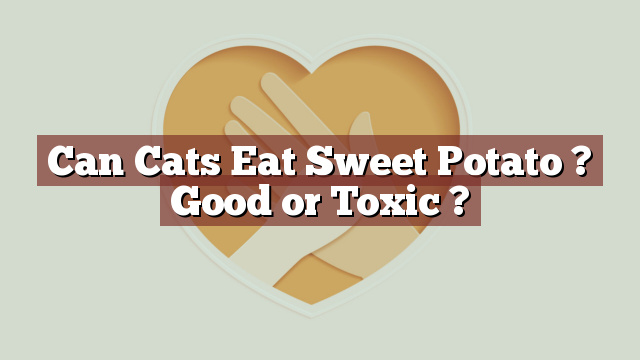Can Cats Eat Sweet Potato? Good or Toxic?
Knowing what foods are safe for our pets is essential for their overall health and well-being. When it comes to sweet potatoes, many cat owners wonder if it is safe to share this nutritious vegetable with their feline friends. In this article, we will explore the nutritional value of sweet potato for cats, safety considerations, potential risks and benefits, what to do if your cat eats sweet potato, and ultimately conclude whether sweet potato can be a healthy treat for cats.
Nutritional Value of Sweet Potato for Cats
Sweet potatoes are packed with essential nutrients that can be beneficial for cats. They are an excellent source of vitamins A, C, and B6, as well as dietary fiber. Additionally, sweet potatoes contain minerals such as potassium and manganese, which are important for maintaining good overall health. The high fiber content in sweet potatoes can aid digestion and promote a healthy gastrointestinal tract in cats.
Can Cats Eat Sweet Potato? Safety Considerations
Yes, cats can eat sweet potato in moderation. While sweet potatoes are safe for cats to consume, it is important to note that they should only be given as an occasional treat and not as a staple in their diet. Cats are obligate carnivores, meaning their diet should mainly consist of animal protein. Therefore, sweet potatoes should not replace the essential nutrients provided by a balanced and complete cat food.
It is always advisable to introduce any new food gradually and in small quantities. This allows you to monitor your cat for any adverse reactions or digestive upset. If your cat has any underlying health conditions, such as diabetes or kidney disease, it is crucial to consult with your veterinarian before adding sweet potatoes or any other new food to their diet.
Potential Risks and Benefits of Sweet Potato for Cats
While sweet potatoes can be a healthy addition to a cat’s diet in moderation, there are some potential risks to be aware of. Sweet potatoes are high in carbohydrates and calories compared to a cat’s typical diet, which consists mainly of protein. Feeding too much sweet potato can lead to weight gain or obesity in cats, especially if they are already prone to these conditions.
Furthermore, some cats may have allergies or sensitivities to sweet potatoes. If you notice any signs of an allergic reaction such as vomiting, diarrhea, or skin irritations, discontinue feeding sweet potatoes immediately and consult your veterinarian.
On the other hand, the high fiber content in sweet potatoes can aid in digestion and help prevent constipation in cats. Additionally, the vitamins and minerals found in sweet potatoes can contribute to a cat’s overall health and immune system.
What to Do If Your Cat Eats Sweet Potato
If your cat accidentally consumes sweet potato without your knowledge or permission, there is no need to panic. In most cases, a small amount of sweet potato is not toxic or harmful to cats. However, if your cat consumes a large quantity or shows any signs of distress such as vomiting, diarrhea, or abdominal pain, it is crucial to seek immediate veterinary attention.
Conclusion: Sweet Potato Can Be a Healthy Treat for Cats
In conclusion, sweet potatoes can be a healthy addition to a cat’s diet when fed in moderation. They provide essential vitamins, minerals, and dietary fiber that can support a cat’s overall health. However, it is important to remember that sweet potatoes should only be given as an occasional treat and should not replace a balanced and complete cat food.
As responsible pet owners, it is our duty to ensure that our cats receive a nutritionally balanced diet that meets their specific dietary needs. If you have any concerns or questions regarding your cat’s diet or the introduction of new foods, it is always best to consult with your veterinarian for professional advice tailored to your cat’s individual needs.
Thank you for investing your time in exploring [page_title] on Can-Eat.org. Our goal is to provide readers like you with thorough and reliable information about various dietary topics. Each article, including [page_title], stems from diligent research and a passion for understanding the nuances of our food choices. We believe that knowledge is a vital step towards making informed and healthy decisions. However, while "[page_title]" sheds light on its specific topic, it's crucial to remember that everyone's body reacts differently to foods and dietary changes. What might be beneficial for one person could have different effects on another. Before you consider integrating suggestions or insights from "[page_title]" into your diet, it's always wise to consult with a nutritionist or healthcare professional. Their specialized knowledge ensures that you're making choices best suited to your individual health needs. As you navigate [page_title], be mindful of potential allergies, intolerances, or unique dietary requirements you may have. No singular article can capture the vast diversity of human health, and individualized guidance is invaluable. The content provided in [page_title] serves as a general guide. It is not, by any means, a substitute for personalized medical or nutritional advice. Your health should always be the top priority, and professional guidance is the best path forward. In your journey towards a balanced and nutritious lifestyle, we hope that [page_title] serves as a helpful stepping stone. Remember, informed decisions lead to healthier outcomes. Thank you for trusting Can-Eat.org. Continue exploring, learning, and prioritizing your health. Cheers to a well-informed and healthier future!

